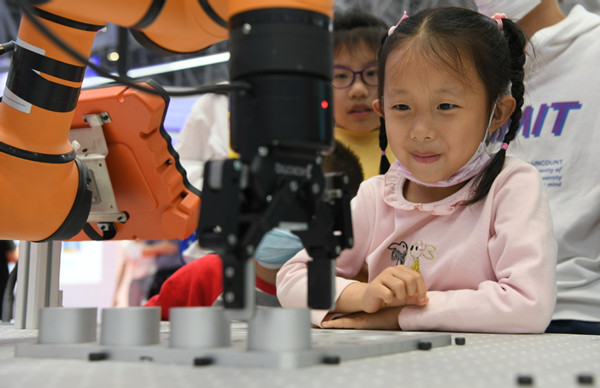Action Plan to Expedite Digitalization of State Firms

A pupil watches a robotic arm in action during the fourth Digital China Summit in Fuzhou, Fujian province. [Photo by Chen Bin/For China Daily]
China will launch a special action plan to speed up the digitalization process of State-owned enterprises, with more breakthroughs in core technologies, said an official during the fourth Digital China Summit in Fuzhou, the capital of Fujian province.
SOEs will accelerate and deepen their digital transformation and create a model of the digital transformation, Weng Jieming, vice-chairman of the State-owned Assets Supervision and Administration Commission of the State Council, said on Sunday at the summit.
"State firms will focus on the demand of China's strategically important and most acclaimed industries, and tackle industrial development bottlenecks. They are expected to make breakthroughs in core technologies such as core electronic components and industrial software, and high-end chips," Weng said.
Weng also said the State asset regulator would offer favorable policies to help the digital transformation of enterprises and help SOEs build a number of digital collaborative innovation platforms and promote industrial coordination.
The State asset regulator said it would further promote smart and green manufacturing, and smart energy, transportation and construction.
SOEs, China's economic backbone, have made significant achievements in their integration of the internet with the real economy. The State asset regulator released 10 remarkable achievements made by SOEs in digital transformation at the summit.
Last year, China's digital economy reached 39.2 trillion yuan ($5.08 trillion) in market size, up by 9.7 percent year-on-year, according to a report released by the China Academy of Information and Communications Technology, a research institute of the Ministry of Industry and Information Technology.
China's digital economy accounted for 38.6 percent of the GDP last year, and it remains a key pivot for the country's economic growth. The penetration rates of internet-based digital economy in agriculture, manufacturing and services reached 8.9 percent, 21 percent and 40 percent, respectively, said the report.
Telecom giant China Mobile said in the next five years, new digital infrastructure is expected to attract an investment of more than 15 trillion yuan. Out of this, 7.5 trillion yuan will be spent in 5G network related investment, and 5 trillion yuan will be used for big data center investments.
"By 2025, China's core sectors that are related to artificial intelligence will have investments in excess of 400 billion yuan," said Dong Xin, general manager of China Mobile.
For the energy sector, State Grid Corp of China said it would further speed up the digitalization process and build new types of power systems. The company has integrated advanced digital and energy technologies to help reduce carbon emissions. It has established the world's largest new energy cloud platform, which is expected to unlock new business value for the power industry.
"Promoting clean energy and the transformation to low-carbon manufacturing is an important responsibility and mission of the energy industry. We have formulated the development outline of digital transformation," said Xin Baoan, president of State Grid.
Agricultural Bank of China said the financial sector has been an important participant in building digital villages. It is making efforts to narrow the digital gaps between urban and rural areas by promoting the use of mobile banking in villages and providing convenient online loan services to small businesses.
